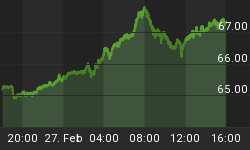Those who take issue with the outlook of Austrian economists in general, and Euro Pacific Capital in particular, have pointed to the persistence of low bond yields as proof that our philosophy does not hold water. We argue that as the United States takes on ever more debt and prints greater quantities of dollars, that buyers of our debt will demand higher rates of interest to compensate for greater risk.
In fact, our philosophy leads us to believe that rates would currently be spiking as Washington debates whether to raise the debt ceiling yet again or default on existing debt. Instead, rates are hitting close to multi-year lows. As a result, our critics have found a seemingly valid issue. However, we believe that there are strong market reasons that are holding rates low for now that do not invalidate our central thesis.
Looked at objectively, there are a litany of reasons why rates should be much higher than they are. Official government data from the Labor Department has year over year consumer inflation rising at 3.4%. With the Ten year note offering a paltry 3.1%, negative real interest rates now extend out over a decade! At the same time, total non-financial debt as a percentage of GDP is at the highest level on record and in our view there are no credible projections that show the trend reversing anytime soon. In addition, with the end of quantitative easing, the Federal Reserve will apparently no longer be soaking up 75% of all new Treasury issuance. Given this, does it make sense that yields on Ten Year Treasuries are trading 60% lower than their 40-year average? Forget the flowers, where have all the global bond vigilantes gone?
But, what makes these low yields on U.S. debt even more unfathomable is the current debate over raising the debt ceiling. If a deal to lower the trajectory of debt isn't reached by August 2nd, we are being told that America could enter into default.
But you wouldn't know it from looking at the bond market. It seems that everyone is convinced the U.S. will never renege on her obligations and that the Democrats and Republicans will come to an agreement with time to spare.
Peter Schiff subscribes to this logic. He believes the bond market is pricing in an increase in the debt ceiling that temporarily lays to rest any fears of default.
As a result, he believes that traders are buying bonds now so they can sell into the "positive" news that will result from a debt deal in Washington. However, Peter believes, as I do, that an increase in the debt ceiling is actually very negative for bonds. That means that after the dust settles he expects interest rates to rise dramatically. But that won't stop the traders from booking a quick profit.
However, I believe there is little to support the belief that a deal will be made.
Republicans have very little incentive to agree on a deal that includes tax hikes, which are an essential prerequisite for Democrats to assent to dramatic spending cuts. The Republicans want spending cuts without any tax increases and that's exactly what they will get if the August 2nd deadline comes and goes. In fact, the Republicans will force a severe dose of austerity upon the American economy, which could be a double-win for the GOP. They may simultaneously balance the budget without increasing revenue and engender a recession that will force the current party out of the White House.
I believe that bond investors may be hedging their bets. If an agreement is not reached there will be a huge reduction in borrowed money that is printed by the Fed. The result will be a severe reduction in the money supply. This forced deleveraging will bring about a needed round of dramatic deflation like we experienced in the fall of 2008. From my perspective that is the best justification for the current low yields on U.S. debt. Maybe the bond market has it right after all; but reasons completely contrary to those offered by market bulls who see low yields as a sign that all is well on the economic front.
Peter and I may differ on the current psychology of bond investors, but we dobelieve that once the economy slows in earnest once again, the authorities willnot hesitate to reignite the monetary madness thereby punishing bond investorswith weaker dollars.
Subscribe to Euro Pacific's Weekly Digest: Receive all commentaries by Peter Schiff, Michael Pento, and John Browne delivered to your inbox every Monday.
Click here for free access to Euro Pacific's new special report: What's Ahead for Canadian Energy Trusts?
Be sure to pick up a copy of Peter Schiff's hit economic fable, How an Economy Grows and Why It Crashes.















